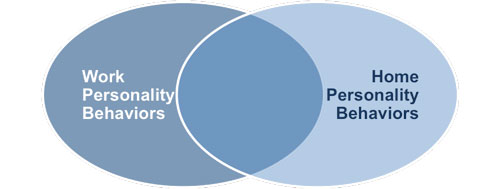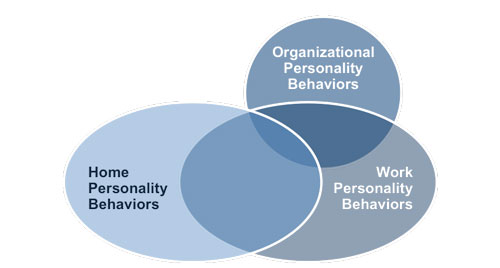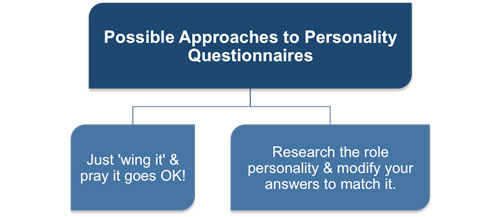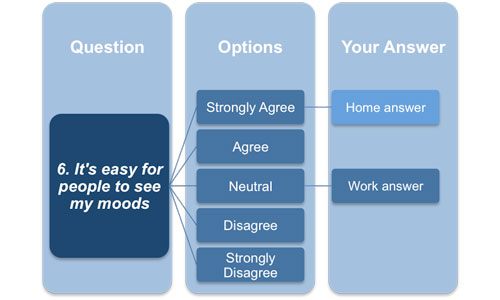Defining Your Work Personality
Very few people find their 'perfect' role. Most of us will have to modify our day-to-day behavior to suit the role or culture we are working in. For example, most of us find some aspects of our jobs require us to modify our preferred behavior. Perhaps you're more assertive at work than you really feel comfortable with, or maybe you're more 'inclusive.'
The point is that we can and do deal with the demands of the workplace by adopting a 'work' personality. Most of us do it fairly effortlessly. We accept that the world of work is not about living within our 'comfort zone' all of the time and we all have the ability to step outside of our natural behavioral preferences in order to get something done.
 |
The diagram above summarizes this: the behaviors that are appropriate for home are not necessarily appropriate for the workplace and vice versa. Obviously there is some overlap and some behaviors are right in both situations.
The work behaviors the role demands will be stated in the job description and specification. Your task is to create a list of the required behaviors from the competencies stated in these documents, prioritizing those most important for the role. You can then check this list and its priorities against the Organizational Personality you have researched, adjusting and adding as necessary. Adding the behaviors of the organization's personality creates the diagram below.
 |
Using the most simplistic interpretation of this diagram you can see that the shaded areas show:
1) Work and organizational behaviors representing the key behaviors of the role.
2) Home, work, and organizational behaviors representing the level of emotional intelligence required by the role with significant emphasis on relationship management.
To find out more information on how to develop your competencies as well as how to develop your emotional intelligence use these links.
With this in mind, there are two approaches you can take to answering personality questionnaires. You alone can judge which is the most suitable, and your decision is likely to be based on how well you judge your current behaviors match that of the role.
 |
Approach 1 - Just 'Wing It'
This may not be a wise choice, but in some instances it could work. You would have to be confident that your innate personality was a perfect match for the organization and role.
In today's competitive environment just 'winging' something as important as a career move is not a good idea. Many of these personality questionnaires are done online, before the interview stage, and you have no way of justifying your answer to a particular question. Remember, these tests are often used to 'screen out' candidates in order to reduce the numbers to manageable levels. The danger with using this approach is that you miss an essential aspect of the role personality that is essential to the organization. This oversight is likely to result in you being rejected without even getting an interview.
Approach 2 - Research and Modify your Answers (a little)
With all the information available to you through the Internet there really is no excuse for not preparing. As a minimum this should involve looking at the personality traits likely to be required by the role and comparing them to your own.
Conducting thorough research into what exactly the organization expects from someone in the role will help you to prepare for all aspects of the selection process, not just the personality questionnaire.
This knowledge will enable you to influence the personality profile in a way that is consistent with the role you are seeking. This is not 'cheating' because personality questionnaires make no allowance for your ability to adapt your behavior to suit the environment. So in order to succeed you need to answer these questions from a work perspective. For example:
 |
Depending on the role and organization the best work answer may be 'Disagree.' But this example gives a simplistic illustration of how to approach this question based on your 'work' personality rather than the more informal one you present to friends and family.
The extent to which you need to modify your answers depends on how dissimilar your work and home personalities need to be. In some jobs they may be quite close, but in many management jobs you will probably need to keep more emotional distance between yourself and others than you would outside of work. You may also need to display behaviors that are a bit tougher and less accommodating than those you would display with your friends and family.
Obviously, the organization/role must be a reasonable fit with your own personality otherwise you will find the work stressful and unpleasant. There would be no point in applying for a job that you were unsuited for; the important thing is that you are able to modify your answers to avoid raising 'red flags' that would result in you being rejected for roles that your track record and competencies show you are ideal for.
You may also be interested in:
Management Personality Tests | The 'Big 5' Aspects of Personality | Popular Personality Questionnaires | Validity Scales | Defining Your Work Personality | 'Make or Break' Questions.



